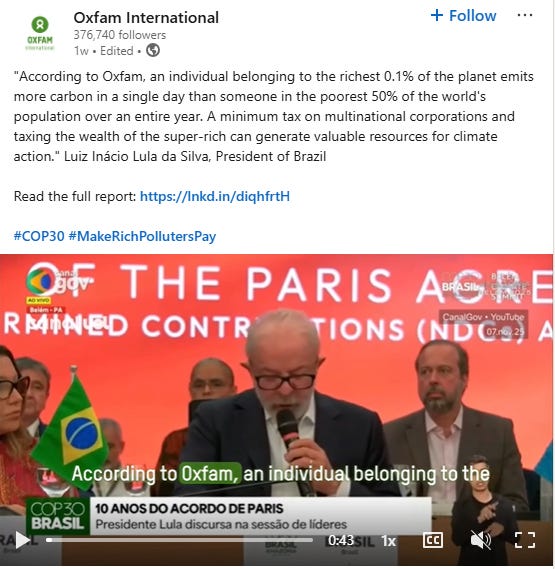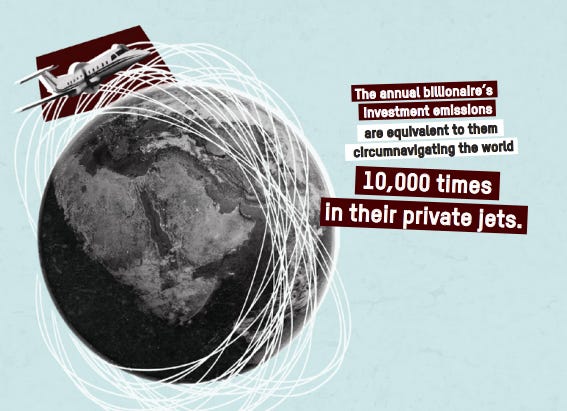For the last fortnight, COP30 in Belém, Brazil, has been a hub of intense climate negotiations. Thousands of corporate lobbyists are attempting to stall meaningful progress on a fair transition away from fossil fuels. Meanwhile, developed countries are blocking progress on climate finance—including the vital funds needed for adaptation.
It’s easy to slide into despair, but here's what’s giving us hope at COP:
Bam! The Belém Action Mechanism is a proposal for a just transition that protects workers’ rights and ensures equity and justice are at the heart of the fossil fuel phaseout. It seeks to guarantee that workers and communities—especially in the poorest parts of the world—are not left behind. Countries representing 80% of the world’s population have already signalled their support!
The power of the people. Indigenous communities from Brazil, Latin America, and across the globe, alongside civil society allies, are marching for justice. They are demanding urgent action to protect our planet’s future and voicing their anger at governments and fossil fuel industries that continue to block progress.
This week’s Bulletin is part 2 of the climate plunder series is about how the super-rich use their political and economic clout to lock the world into climate disaster.
Climate power inequality…in numbers
Climate inequality on the centre stage. At COP29, António Guterres, UN Secretary-General highlighted Oxfam's climate inequality research to world leaders in his opening address. At COP30, President of Brazil, Lula da Silva, shared Oxfam’s headline stat with a message to tax the wealth of the super-rich.
COP is riddled with lobbyists. You can’t throw a stone without hitting a fossil fuel lobbyist at COP30. They outnumber all delegations except Brazil; 1 in 25 attendees is a fossil fuel lobbyist, research from the Kick Big Polluters Out found last week. An Oxfam investigation with the Guardian found that one in four billionaires at COP28 made their fortunes in highly polluting industries such as oil, gas, mining or chemicals.
Litigation terrorism by the super-rich. It’s not just lobbying. Investor–state dispute settlement (ISDS) mechanisms are being widely used by the rich to hold back climate action. ISDSs are established in many investment treaties and allow corporations to sue countries that harm their profits by introducing new rules. They are typically brought against low- and middle-income countries by rich corporations and individuals. $120bn of public money was won by corporations in ISDS courts, with $84bn going to fossil-fuel corporates and $7.8bn to mining corporates.
Corporate-sponsored misinformation. Fossil fuel corporations have been found to adopt the same tactics as the tobacco industry, spending millions on networks of advocacy organisations spreading climate disinformation. The Koch brothers, who made their fortune in the fossil-fuel industry, gave over $145m to 90 organisations that attack climate science and policy solutions from 1997 to 2018. In France, billionaire Pierre-Édouard Stérin was reported to be investing €150m to bolster the far right, while the CNews network was bought by far-right fossil-fuel billionaire Vincent Bolloré, who rebranded it as the French equivalent of Fox News. The channel was fined €80,000 in 2024 for broadcasting climate misinformation.
Financing hate to promote fossil-fuel interests? In 2018, donations to anti-climate change action groups totalled $808m, with family foundations providing significant amounts of these donations. Wealthy donors are also secretly funding far-right and white supremacist movements, which spread racism, anti-transgender and misogynistic views, and are more likely to support politicians with regressive climate agendas.
Are wealthy individuals, many of whom have fossil-fuel interests, using hatred to build support for poisonous politicians whom they can count on to introduce anti-climate policies?
Financing the climate breakdown. Billionaires dominate every aspect of the global economy, controlling 17 of the 50 largest listed corporates in the world, either as CEO or principal investor. Oxfam’s research uncovered the investment portfolios of 308 billionaires. It found that:
In 2024, the investment emissions of the 308 billionaires totalled 586 million tonnes of CO2e, more than the combined emissions of 118 countries; if they were personified as a country, then they would rank as the fifteenth-most polluting country in the world, ahead of South Africa.
On average, a billionaire’s annual per capita investment emissions are 1.9 million tonnes of CO2e, which is 346,000 times more than the average person. These billionaires would have to circumnavigate the world almost 10,000 times in their private jets to emit this much.
Two-thirds of the corporates they invest in are not aligned with the 1.5°C Paris Agreement target, and one-third have decarbonisation plans aligned to a 4°C world.
They tend to invest in much more polluting corporates than average. For every $1m invested, billionaire investments produce over two and a half times more emissions than the S&P 1,200. Almost 60% of the billionaire investments are classified as being in high climate-impact sectors, such as mining or oil and gas companies, compared to 49% for the S&P 1,200, and 14% of their wealth is from corporates with fossil-fuel revenue, compared to 9% for the S&P 1,200 – a 55% higher share.
Billionaires could direct their investments towards less climate-damaging corporations. If they instead chose an investment fund which prioritises good environmental, social and governance (ESG) performance, they could cut their emissions by 23 times.
Read the full report here (available in English, Spanish, French, Portuguese and the summary in Arabic)
The workings behind the stats can be found in the methodology note here.
Something to read and listen to
Listen to Marinel Ubaldo on Equals, taking us inside the night Typhoon Haiyan hit, how her community rebuilt, and the extraordinary human-rights case she helped push forward to hold fossil fuel giants to account.
Read the report from the G20 Extraordinary Committee of Independent Experts on Inequality who presented their report to President Ramaphosa in Cape Town last week. They will present their findings at the G20 Leaders’ Summit on 22/23 November. 500 top economists have come out in support of an international panel on inequality.
Read Oxfam’s Rebecca Riddell ‘A ‘Golden Age of America’? More Like Trump’s Gilded Age’





